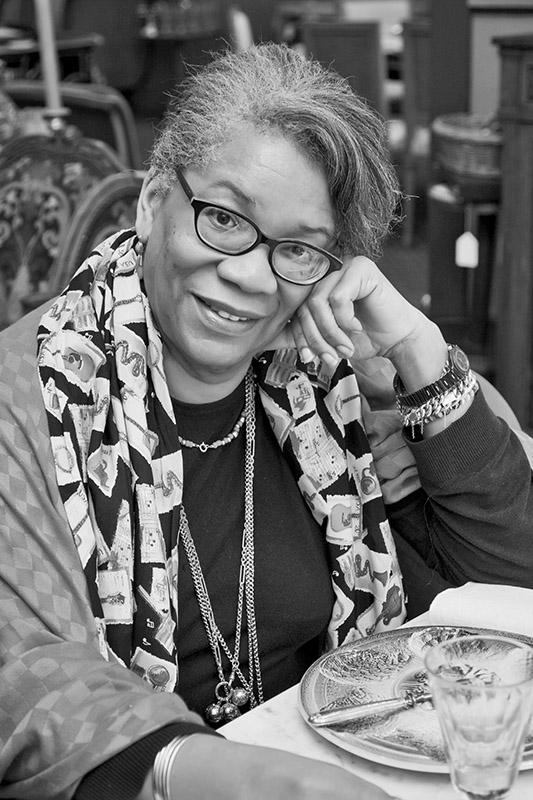Dr. Jessica B. Harris at Lucullus, a culinary antique store in the French Quarter. Dr. Jessica B. Harris will give a talk on Thursday July 26, discussing her memoir, “My Soul Looks Back.”
The Cottagers are moving the celebration of African American history outside of Black History Month. “People say, ‘I don’t want African American history, that has nothing to do with me,’” said African American Culture Festival co-chair Lynn Bolles. “Of course it does. It’s everybody’s history. Women’s history wasn’t seen as part of the American story either. We are all burdened with that legacy. It’s our job to put that message out, so that they can’t say that they didn’t know.”
The Cottagers’ 13th annual African American Cultural Festival will commence on Thursday, July 26, with a talk by seasonal resident Jessica B. Harris. She will be discussing her memoir, “My Soul Looks Back,” on Thursday evening at 6:30 at Cottager’s Corner in Oak Bluffs. In the book, Harris remembers how her youth was shaped by her friendship with black visionaries such as Maya Angelou, James Baldwin, and Toni Morrison. She went on to become a successful literary critic and cookbook author.
“This memoir is part of the ongoing story of African Americans to which she was a witness in the late ’60s, early ’70s,” said Ms. Bolles, “Not everybody gets to hang out with these people and have them be guides in terms of the importance of social justice: How do you put that in your art, how do you put that in your scholarship and research? Then, of course, there’s the impact of that on her as a person. In the memoir, she has all of her notebooks and all of her journals, and she’s at a point in her life when she’s thinking, ‘What did I think at 21 years old, now that I’m 45 years older than that?’” The talk will be followed by a book signing.
“Part of what my co-chair, Joanne Edey-Rhodes, and I have been able to do, because we’re both academics, we’ve worked really hard to make sure that there’s not only historical attributes to this festival, but we try to incorporate the historical and cultural aspects of what we do and why we do it, and the significance of the Cottagers as a historical organization,” said Ms. Bolles.
The Friday and Saturday after the talk, swing by Hartford Park, just outside Cottager’s Corner. There will be vendors and artisans selling all sorts of crafts. Inside, Chef Deon will be selling Caribbean food, there will be an exhibit on the Black Panther Party, and over the two days there will be a series of mini-talks.
“At this point,” said Ms. Bolles, “[the talks] will be covering everything from ancestry.com to talking about fertility issues, women’s reproductive health and what that means in this age, and the whole question about affordable care. It’s an array of talks on different social issues, primarily having to do with African Americans, but of course, it’s with everybody. Every woman has fertility, every woman has issues with fertility.”
Over the decade or so that Ms. Bolles and Ms. Edey-Rhodes have been co-chairing the festival, they have worked to make it a fun and educational event. “What propelled Jo-Anne and I was that we felt like we needed to put more oomph in this,” said Ms. Bolles, “It started off with having African drumming and really important cultural events at the beginning, and then we settled down and realized that we had to crank this up. This was more than a street fair. We had to make this very significant. Some of our vendors have come back over a decade, not only because it’s a good experience and you make some money, but it’s also about black entrepreneurship. You have to look at this Island: Where are the small businesses owned by nonwhite people? There aren’t very many.”
Ms. Bolles emphasized that this is a weekend for everyone: “African American history is not just for African Americans; it’s everybody’s history. That’s the important part here.”




